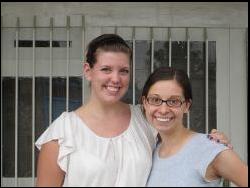

|
Fellows’ Flyer |
|
May/June 2011 |
|
News and views for and by Princeton in Africa Fellows |
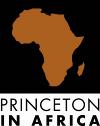


|
Muraho from Kigali, Rwanda! I have been here since August 2010, working as the Program Assistant at Generation Rwanda.
A unique scholarship program, Generation Rwanda supports the most disadvantaged and motivated students to pursue higher education in Rwanda. It offers them a holistic support package, complete with not only university tuition but also housing; healthcare; monthly living stipends; trainings in English, computer skills, entrepreneurship, and leadership; career development services, counseling, and more. As this is the best university scholarship available in the country, it is extremely competitive and recent years have seen acceptance rates of only 1%-2%.
My daily tasks are to oversee and implement a variety of programming, essentially making sure that everything runs smoothly and that students receive the support they need to excel at university. At the moment I am organizing entrepreneurship training, conducting a program evaluation, and overseeing the 2011 new student selection process. It fulfills me to reflect that in the big picture, I am making a tangible difference in the lives of vulnerable students who will likely go on to change their communities and be the future leaders of Rwanda.
Every day here is an adventure in which I learn more and fall more in love with Rwanda.
Top Ten List: Best Things about Rwanda
· I live at the base of Mount Kigali, a mountain whose peak offers a breathtaking 360-degree vista of Kigali and a view of the twinkling Nyabarongo river snaking through southern valleys. · A huge, delicious avocado in my neighborhood costs $.16. · In less than three hours on a bus, I can find myself over the border on a visit to neighboring Uganda, Burundi, Democratic Republic of Congo, or Tanzania. · Every day at work I support, interact with, and learn from bright and motivated university students whose painful histories encourage them to work hard and inspire me to overcome and find enjoyment in my own challenges. · When I trip or fall in public, instead of laughing or pointing people shout “sorry!” and rush to help. · I live across the street from a lively Congolese bar where a very large bottle of beer costs $1.25. · On Sundays I visit the local market, ten minutes from my house, and stock up on fresh passion fruit, mangoes, onions, and tomatoes. When there’s something I can’t find at the market, I put an order in with Etienne, a kind vegetable man who comes by my office each week. · A frequent evening activity for my housemate and me is to visit our Rwandan “aunt” up the street and inevitably stay for a delicious dinner feast. · The country abounds with natural wonder: known as the “Land of a Thousand Hills,” tiny Rwanda is home to five volcanoes, twenty-three lakes and rivers (including the most remote source of the Nile), vegetation ranging from dense rainforest to tropical savannah, beautiful beaches, and world-famous mountain gorillas. · When schoolchildren in my neighborhood see me returning after a day at work, they run to me at full speed and throw their arms around my waist to welcome me home.
|
|
Notes from the Field |
|
Helaina facilitating a workshop on plagiarism for Generation Rwanda students |



|
Notes from the Field |
|
Sarah Manion and friend |
|
A traditional dancer at a festival in Ouangdango, Central African Republic held in honor of Women’s Day |
|
Helaina teaching an English class—English is now the primary educational medium in Rwanda |
|
by Sarah Manion, ‘10-’11 Fellow at International Rescue Committee, Central African Republic |
|
Tel: 609.258.7215 Fax: 609.964.1818 piaf@princeton.edu |
|
Mailing address: Post Office Box 226, Princeton, NJ 08542 Street address: 194 Nassau Street, Suite 219, Princeton, NJ 08542 |
|
March 8th. International Women’s Day 2011; a day celebrated across many African countries but with special meaning for those women gathered here in the village of Ouandago. When we arrived, the parade of women dressed in colorful printed dresses was just amassing. They carried signs identifying the clubs, organizations and partnerships that existed in the region and banners insisting on the importance of female autonomy and development.
As official delegates from the International Rescue Committee, our small party was ushered to a place of honor under a palm frond canopy with the regular assortment of government and local officials. As I sat there watching the display of traditional dances and listened to the speeches in Sango, the lingua franca of C.A.R., I considered the incredible adaptability of the community before me, and the citizens of the Central African Republic at large. Plagued by violence, war and underdevelopment – these people have truly suffered.
The local government authority decided to host the region’s Women’s Day celebrations in the small town of Ouandago as a symbolic gesture to show hope in the way forward. Just a few years before, this town had been the seat of terrible violence, which had driven people from their homes and destroyed the local economy. But just a short time later, that community was able to offer its display of richness and its determination to rebuild.
There we were in a rebel-occupied town in the north of CAR, but for once it had little to do with a survey, mediation or report of some violent act. Instead, there was an effort to regain what had been so fundamentally shredded during the rebellion – a sense of trust in community.
From where I sat that day, I could see the government authorities chatting with the local rebel representatives. Behind them sat UNICEF and WFP employees. Next to me, a large group of Muslim women in beautifully colored long satin dresses edged closer under the tent out of the searing hot sun. And before me, a true sense of pride emanating from a community in desperate need of the normalcy of this celebration. For once it wasn’t about the NGOs and their projects – it was about the people and their struggles for their country. |
|
Upcoming PiAf Events |
|
My favorite time of day is 8:03 a.m. That's usually around the time I close my cerulean gate behind me, allowing the black woosha (dog) back into the compound after a night of debauchery on the streets of Addis Ababa. A breeze carries the scent of injera (traditional Ethiopian bread) baking at my neighbor's house.
There is music playing from the school down the street - sometimes traditional Ethiopian songs but often American music by Rihanna or Snoop Dogg or Beyonce. Students run down the cobblestone street in their green and tan uniforms if they're young, or swagger to class in black and white uniforms if they're older.
I navigate my monochromatic friends and reach the corner, where Abay stands outside of his house, proudly surveying the happenings on the street, usually without pants. He puts his two-year-old hands on his hips and leans back to watch three garbage cleaners walking behind a huge wheelbarrow, their mouths and noses covered in scarves like ninjas to keep away the smell.
Abay spots me:
"Indetnaw? Tadias?" I greet him.
"Dehnaning," he says softly, extending his dirty hand and kissing me three times - right cheek, left, right. We hold hands and walk down the street until we reach the shop at the corner.
We say our goodbyes, and then I watch as Abay’s bare bottom toddles back home.
Beeeeeeeeeeeeeeeeeep!
A driver laying on his car horn brings me back to the task at hand: getting to work at the World Food Programme in Addis Ababa, Ethiopia. I’ve spent the last nine months working in the Public Information Unit, researching and writing material for internal and external communications and coming up with new ways to get the word out about WFP in Ethiopia.
“Kazanchis!” the conductor leans out the window of the minibus, hollering its destination.
I push my way to the front of the line and hold my arms out so no one sneaks in before me. Inevitably, the conductor directs me to the row of seats that’s already fully occupied. I perch on the side of the seat, holding the ceiling and balancing my bag while pulling out my 1 birr, 25 cents (about 7 cents in USD).
The radio blares. We pass taxi drivers sitting in the café waiting for their next fare, drinking buna (coffee) and chewing chat. My favorite vegetable stand appears on my left, Yoseph, the owner, usually reading a book in Amharic. Then we hit the shops: groceries, electronics, internet cafes, dry cleaners, bars, restaurants, hotels. Everyone trying to be an entrepreneur, make a buck.
More people flood the street as we near our destination, standing before the butchers with huge goats hanging from hooks in the stores, waiting in line to fill jerry cans of gas at the petrol station that may or may not actually have gas to sell, sitting on the street in tattered clothes and chanting religious sayings as they hold out their hands for money.
I cross my fingers that the traffic cops are at the corner today so I can cross the street. The stray dogs on the corner barely look up from their nap as I step into the WFP compound and wait until 8:03 tomorrow.
|

|
Allie at her desk in the WFP Addis office |
|
Allie greets her neighbor Abay on the way to work |
|
The No. 1 Ladies’ Detective Agency Author’s Note: This short story is written in homage to ‘The No.1 Ladies’ Detective Agency Series’ by Alexander McCall Smith. The Baylor clinic is real, of course, and is in fact where I have spent my 2010-2011 PiAf Fellowship year, although neither Mma Ramotswe nor any aspect of the book series play any role in its activities (yet!). Character names have been adapted from the novel but all other happenings are of my own invention and any resemblance to real persons or events are purely coincidental.
The No. 1 Ladies’ Detective Agency had seen many changes in Botswana through the years but nothing like the arrival of HIV/AIDS.
It began with the usual husbands and wives reporting wayward/suspicious behavior. But these were soon accompanied by tales of a strange wasting illnesses, a disease that seemed to be “killing everyone these days.” Grandmothers reported missing sons and daughters, angrily towing along abandoned grandchildren with sad eyes and running noses.
During that time Mma Ramotswe thanked God that Mr. J.L.B. Matekoni was a faithful man. She had founded the agency just 5 years before and had made a comfortable living solving cases of imposter daddies and stolen livestock. Now she even had to employ a nurse and offer HIV testing.
By 2003 the government was beginning to get a handle on the situation but didn’t yet know what to do for children who were born with the virus. Mma Ramotswe was among the dignitaries invited to celebrate the Botswana-Baylor Children’s Clinic, made possible by a generous donation from Bristol-Meyers Squibb, and which sprung up behind Princess Marina Hospital like a fount in the middle of the desert. This happy beginning coincided with Mma Ramotswe’s decision to retire far North to Kasane where she now spends much of her days with Mr. J.L.B. Matekoni, gardening and sipping Bush tea.
Her adopted daughter Motholeli had gone overseas to study something called forensic anthropology which, Mma Ramotswe thought, was a funny (and expensive) way to describe what she had used her own woman’s intuition and common sense to do for so many years. Upon her return, Mma Ramotswe had allowed her daughter to tack on to her sign, THE NO. 1 LADIES’ DETECTIVE AGENCY FOR CRIME SCENE INVESTIGATION. The agency now even had its own forensic lab and computer system to suit its new focus.
Now, 12 years after opening the doors of THE NO. 1 LADIES’ DETECTIVE AGENCY, Mma Ramotswe was enjoying her old age and the simpler challenges of domestic life – baking bread, pesky elephants, a relentless weed. Imagine her surprise when she was called urgently to Gaborone on official agency business.
A small boy had come to the office to complain that on the last Saturday of every month his best friend would go missing. He wouldn’t pick up his phone and his family members were also being very secretive.
“And during the week? Does he ever miss school?” Motholeli had asked him.
“No.” the boy had then scratched his head for a moment, “Well, yes. But not more than your average student.”
He had then explained that before his friend started disappearing those Saturdays he seemed rather depressed. Although he came from a rich family background his parents were fighting a lot and it appeared there was a lot on his mind perhaps due to the tension at home. Then, without warning, he began disappearing only on the last Saturday of every month.
“Before, he used to tell me everything. Now, he tells me everything except where he goes on Saturdays. And since then he’s happier than I am, imagine! I’m worried he might be getting into drugs!” Motholeli had nearly choked on her tea at that moment. The boy didn’t look more than 12! At the end of their consultation the young boy had given Motholeli a picture of his friend and promised to pay her in gardening services.
Nosey classmate or good friend? Although she was a scientist by training, Motholeli’s natural intuition told her that this was a very delicate matter that required the wisdom of old. Detective or not, you just didn’t go around following people these days, even small boys. This is why she had called her mother.
After hearing this, Mma Ramotswe took a few sips of tea, thought carefully about places a child could disappear to and then she remembered – the Baylor Clinic! As she drove up to the clinic in her small, white, Mercedes – a gift from her daughter who somehow thought it would be less conspicuous than her trusty white van – She could hear singing and clapping from the back yard.
“Can somebody tell me what good adherence is?” a nurse was asking the group. A someone who looked like the small boy’s friend was the first to answer, “Good adherence is taking your medication at the same time every day!” The group applauded.
Mma Ramotswe noted that there were nearly 200 teenagers gathered there. A black American volunteer who introduced herself first with an African sounding name and then with her given Setswana name, Lame, asked that the teenagers separate themselves into 2 groups so that they could begin the day’s activities. The small boy’s friend looked more than happy, he looked free.
Back at the agency Mma Ramotswe decided the best way, would be to tell the small boy a story.
“Do you know that an ostrich is just like a fat chicken whose legs and neck have been stretched out?” The boy nodded. Mma Ramotswe continued. “Then you must also know that chickens have two stomachs and that they must swallow stones to help their digestion. We in Botswana have been blessed with diamonds. But a diamond ring first begins as a shiny stone that is mined and then polished. Ostriches love shiny things and have been known to eat diamonds. Imagine, a stomach filled with diamonds!” Mma Ramotswe paused for effect noting the boy’s wide-eyed expression. “Now, the question is, will you cut open the belly of every ostrich in hopes that you will strike it rich? Why not wait for him to spit it up or to die naturally according to God’s time?” The small boy seemed to think for a moment.
“I found your friend. Every Saturday he enters a place that is like the stomach of an ostrich. Give him time. If he is indeed your best friend, trust that he will reveal himself to you when he is ready.”
And on that note, Mma Ramotswe handed the small boy a shovel, got into her daughter’s car and headed back to Kasane.
The end.
About Teen Club For more information or to make a donation please visit our website: http://botswanateenclub.wordpress.com
|

|
by Mgbechi Erondu ‘10-’11 Fellow at Baylor/Bristol Myers-Squibb Children’s Center, Botswana |
|
Notes From The Field |
|
Mgbechi at Maun Teen Club Satellite Site Training on Finances and Budgeting |
|
Mgbechi at the top of Kgale Hill, overlooking the Gabs Dam |
|
Highlights from 2010-2011 Fellows: Allie Bream in Ethiopia, Helaina Stein in Rwanda, Sarah Manion in Central African Republic and Mgbechi Erondu in Botswana |
|
by Allie Bream, ‘10-’11 Fellow at World Food Programme, Ethiopia |
|
Notes from the Field |
|
PiAf Alumni and Friends Gathering at Princeton Reunions Saturday, May 28, Post P-Rade-6:30 PM, @ 1915 Hall at Butler College, conveniently located along the P-Rade route. Princeton in Africa alumni and friends are invited to catch up with one another and the program. PiAf staff will share highlights and recently returned Fellows will be present to discuss their fellowship experiences. Come join us for refreshments and to help us kick off yet another exciting fellowship year!
The Second Arab Awakening: a conversation with Ambassador Frank G. Wisner '61 Princeton in Africa joins with the Princeton Club to provide perspective to the history being made in North Africa. Cost is $10 for members, $15 for non-members (includes 1 free drink). RSVP to events@princetonclub.com.
|
|
Hot off the Presses: Princeton in Africa just mailed out our Spring 2011 Newsletter! In it you’ll find reflections from current and former Fellows, alumni updates, photos from the year’s events and much, much more. View it online here. |
|
News from the PiAf Office: —Hot Off the Presses: PiAf’s Spring 2011 Newsletter |
|
Allie on a field visit with World Food Programme |

|
Recent PiAf Presentations |
|
by Helaina Stein, ‘10-’11 Fellow at Generation Rwanda, Rwanda |




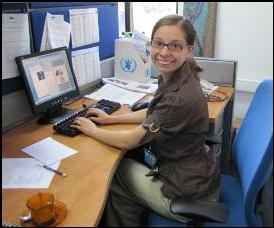
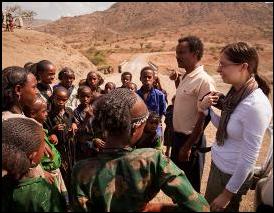
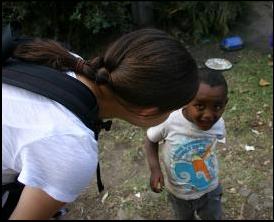
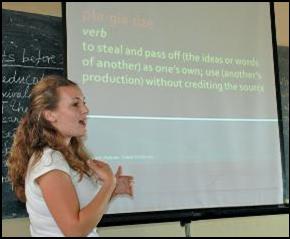
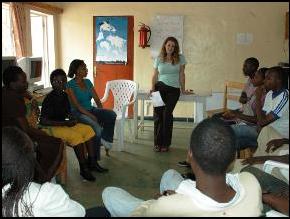
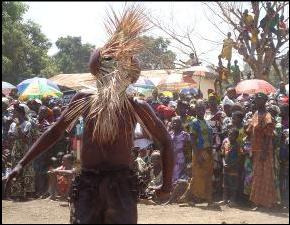
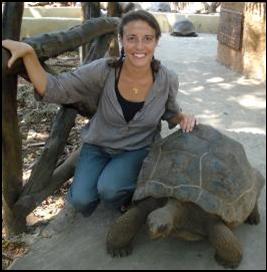
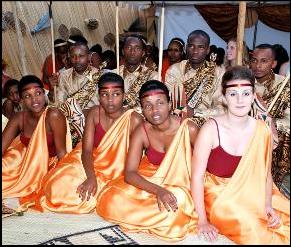
|
Helaina as a bridesmaid in a Rwandan wedding |
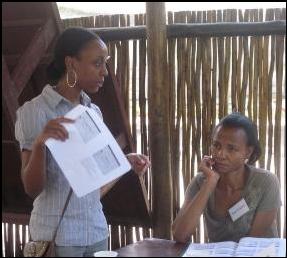
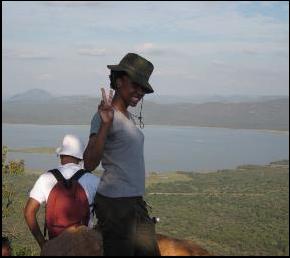
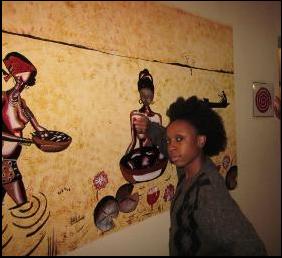
|
Mgbechi posing near a beautiful painting of mokoros and women collecting water Lily's [After eating the Best Pizza in all of Botswana!]. Water Lily Lodge, Kasane |
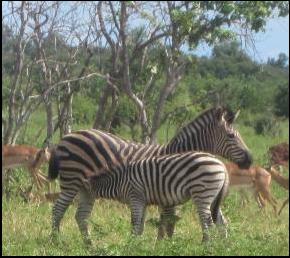
|
Botswana's National Animal: the zebra; Chobe National Park, Kasane |

|
Teen Club’s Logo |
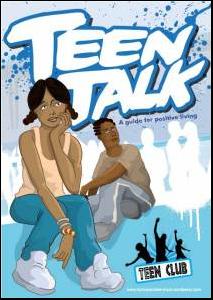
|
Teen Talk: A Guide to Positive Living |
|
On Earth Day, Chris Courtin (left), ‘10-’11 Johnson & Johnson Fellow at Nyumbani Village in Kenya, gave a presentation to Johnson & Johnson in New Brunswick, NJ. Nyumbani is working to create a self-sustaining village and family-like setting for orphaned children through its village sustainability program. To find out more, check out Chris’s blog.
On April 13, Chris also presented with Cordelia Persen, PiAf’s executive director, at Indaba, Princeton University’s Program in African Studies weekly speaker series on African topics.
Cordelia was invited to speak on a panel during the Colloquium on Education, Science, and Technology in African Development held on Princeton’s campus March 31 and April 1, 2011. She spoke with 2 other panelists on Globalization, Science and Technology in Africa. |
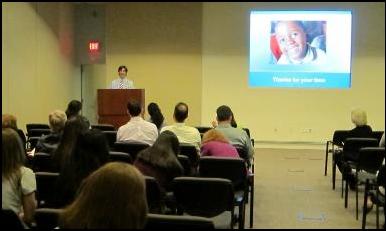
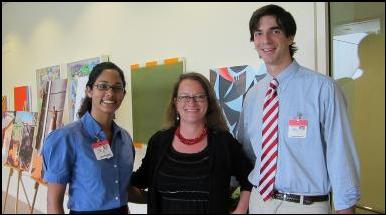
|
(Left) Amanda Ramcharan (‘11-’12 Johnson & Johnson PiAf Fellow at Nyumbani, Kenya) with PiAf’s executive director, Cordelia Persen and Chris Courtin (‘10-’11 Johnson & Johnson PiAf Fellow at Nyumbani, Kenya) at Johnson & Johnson’s Earth Day event.
|

|
2011 PiAf Fellows’ Orientation |
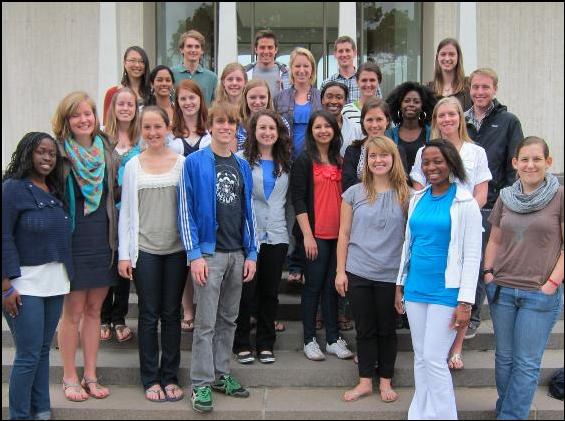
|
On May 14 and 15, PiAf held its orientation for the Fellows class of ‘11-’12. This year we have 33 Fellows from 17 universities who will be working at 23 organizations in 14 countries.
In 2011-12 a Fellow will be working in Mali, which brings to 31 the total number of countries in which PiAf Fellows have worked to date. We are also excited to be partnering with 10 new organizations in Africa.
Our new class of Fellows is bright, energetic and ready to head to Africa and start working! We are thrilled to share in their upcoming journey. Click here to view our Facebook photo album of orientation.
|
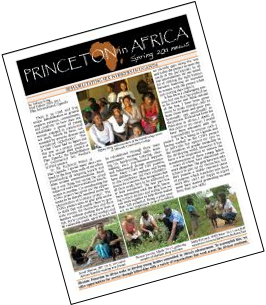


|
PiAf’s Spring 2011 Newsletter |

|
PiAf Fellow Elly Sukup (WFP, Ghana) and PiAf Fellow Allie Bream (WFP, Ethiopia) during Elly’s visit to Addis Ababa, Ethiopia. |
|
PiAf Connections: PiAf Fellows, Alums and Board Members meet up around Africa |
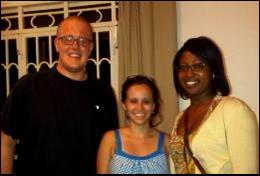
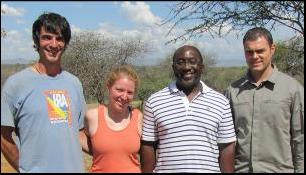
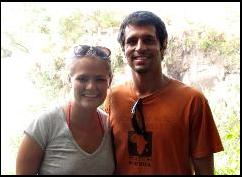
|
PiAf Fellow Hannah Burnett (mothers2mothers, South Africa) explored Victoria Falls in Zambia with PiAf Fellow Jamie Nadeau (Kucetekela Foundation, Zambia). |
|
PiAf Fellows Chris Courtin (Nyumbani, Kenya) and Theresa Laverty (Mpala, Kenya) join PU professor and PiAf board member Wole Soboyejo & former PiAf Fellow Keir Soderberg (‘01-’02 Fellow at Quantitative Literacy Project, South Africa) at Mpala. |
|
PiAf Fellows Tony Speare (Lutheran World Federation, Burundi), Vicki Esquivel-Korsiak (IRC, Uganda), and Tiffany King (Plan International, Uganda) ran into each other at a dinner party in Kampala, Uganda. |
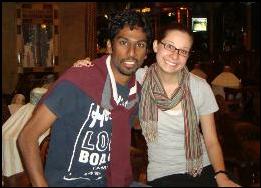
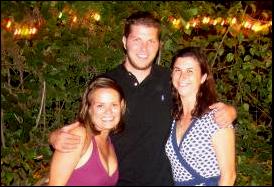
|
PiAf Fellows Hannah Burnett (mothers2mothers, South Africa), Case Martin (IRC, South Sudan), and Mary Reid Munford (African Impact, Zambia) enjoyed dinner together in Livingstone, Zambia. |
|
PiAf Fellow Veda Sunassee (African Leadership Academy, South Africa) enlisted Fellow Allie Bream WFP, Ethiopia) to help with ALA’s student interviews in Addis Ababa, Ethiopia. |
